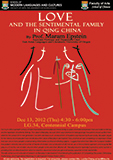
| News & Events |
| 13 December 2012 | |
Seminar: Professor Maram Epstein Date: Dec 13, 2012 (Thu) |
|
Abstract : For much of the twentieth century, scholars have looked at the traditional Chinese family as a place of emotional repression that was hostile to intimacy and the expression of authentic feelings. The culture of filial piety, because of the way it reverses the biological logic that parents should sacrifice themselves for the survival of the next generation, has been dismissed as an unnatural form of ritualized duty imposed by feudal society. The speaker's paper argues for the need to reconceptualize how we talk about the culture of filial piety in late imperial China, and that we start considering it an expression of love that was core to many people’s understanding of themselves as ethical and feeling subjects. In short, she suggests that rather than follow the European tradition that positions romantic love at the center of histories of emotion and construction of self, that we use a China-centered approach and recognize filial piety as a, if not the, core emotion around which people constructed their affective self. Filial piety became especially important to some women in providing them an ethical basis from which to resist the cultural norms that saw girls as temporary sojourners in their natal families.Her talk draws widely from a variety of late imperial texts texts including fiction, chronological biographies (nianpu), court case memorials, and exemplary biographies from local gazetteers. Professor Maram Epstein is the Associate Professor and Department Chair, East Asian Languages and Literatures, University of Oregon This talk comes out of a decade of research on filial piety in late imperial China following the publication of Competing Discourses: Orthodoxy, Authenticity, and Engendered Meanings in Late-Imperial Chinese Fiction (2001). Core to both projects is my interest in understanding the place of emotion in the changing constructions of gender in late imperial China. |
|
